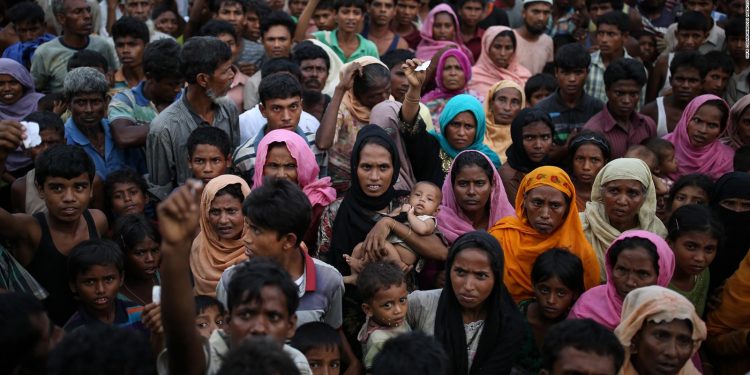Dhaka: Newly-elected President Mohammed Shahabuddin Tuesday urged India to take more effective steps in persuading Myanmar to take back the Rohingyas who were forced to take refuge in Bangladesh to evade persecution in the neighbouring country.
“The President made the request when Indian High Commissioner to Bangladesh Pranay Kumar Verma met him at Bangabhaban,” a presidential palace spokesman told reporters here.
Shahabuddin, 73, was sworn in as the 22nd president of Bangladesh April 24. He succeeded Abdul Hamid whose tenure ended April 23.
Verma paid a courtesy call on President Shahabuddin and conveyed to him warm greetings from President Droupadi Murmu and Prime Minister Narendra Modi and discussed recent bilateral developments, the Indian High Commission in Dhaka tweeted.
During the meeting, President Shahabuddin said that Bangladesh has sheltered the Muslim ethnic minority community for humanitarian reasons, and their prolonged stay is creating problems not only for the South Asian country but for the entire region, in an apparent reference to the escalating security risks including terrorism.
Nearly one million Rohingya Muslims fled a crackdown by Myanmar’s military in 2017 in Rakhine state and are living in camps in Cox’s Bazar in Bangladesh.
India has always called for the sustainable and speedy return of displaced persons to the Rakhine state of Myanmar. India has worked with Bangladesh and Myanmar to resolve this issue.
Shahabuddin said Bangladesh attaches highest importance to its relations with India which is so closely linked by geographical proximity, shared history and sacrifices.
He termed the existing bilateral ties as “strong and unique”.
Shahabuddin, himself a Liberation War veteran, also recalled the training he received during his stay in India in 1971 during the independence struggle.
He said the prime ministers of Bangladesh and India recently visited each others’ capitals and their “visits have opened a new chapter in the relationship between the two countries”.
Shahabuddin said Bangladesh gave India access to Chittagong and Mongla seaport for transporting goods from the mainland to its north-eastern states. He expected the move would significantly cut time and cost needed to transport goods to India’s northeastern states and West Bengal and push regional connectivity in Bay of Bengal.
He also noted that Dhaka and Delhi signed the ACMP (Chittagong and Mongla Port) agreement in 2018 and the deal would accelerate the socio-economic development of the two countries along with the increase in trade and commerce.
The President hoped that the two countries’ unresolved issues, including the water distribution agreement, would be resolved soon through mutual cooperation and discussion.
The high commissioner said India attaches highest importance to the relationship with Bangladesh.
“Connectivity between the two countries has grown tremendously in the last one and a half decades. As a result, the people of both countries are enjoying its benefits,” Verma added.
“The connectivity between the two countries has increased manifold over the last 15 years. People of both countries are enjoying this.”
The Indian envoy informed his country’s appreciation for Bangladesh’s “Zero Tolerance Policy” against terrorism and said it resulted in stability in the region which is contributing positively to the economic development of both countries.
PTI






































